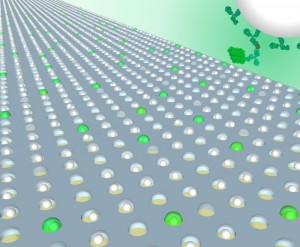Detecting disease, one molecule at a time Million-fold improvement of biomarker detection limit

Enzyme-linked immunosorbent assay (ELISA) is widely used for the detection of protein biomarkers for diseases and infections, as it amplifies the signals of those biomarkers by using enzymes conjugated with antibodies. However, the sensitivity of the conventional ELISA is not sufficiently high for the earliest diagnosis of many diseases and infections. Conventional ELISA has a limit of detection (LOD) of several tens of pg/mL (10-11 g/mL) concentration of the target, where the ensemble of enzymes is measured in a relatively large reactor volume with microliters (10-6 L).
Professor Hiroyuki Noji, Research Associate Soo Hyeon Kim, and Lecturer Ryota Iino at the Department of Applied Chemistry in the University of Tokyo’s Graduate School of Engineering have developed a single-molecule digital ELISA which realizes a million-fold improvement of the ELISA detection limit. They have successfully applied one million ultra-small water droplets with a volume of femtoliters (10-15 L) arrayed in a 1-cm2 area to detect a biomarker for prostate cancer with an LOD of 60 ag/mL (6×10-17 g/mL). In the near future, this method will enable the development of highly-sensitive portable devices for the early diagnosis of many diseases and infections.
Press releasePaper
Kim SH, Iwai S, Araki S, Sakakihara S, Iino R, Noji H,
“Large-scale femtoliter droplet array for digital counting of single biomolecules”,
Lab on a Chip Online Edition: 2012/8/15 (Japan time), doi: 10.1039/C2LC40632B.
Article link








